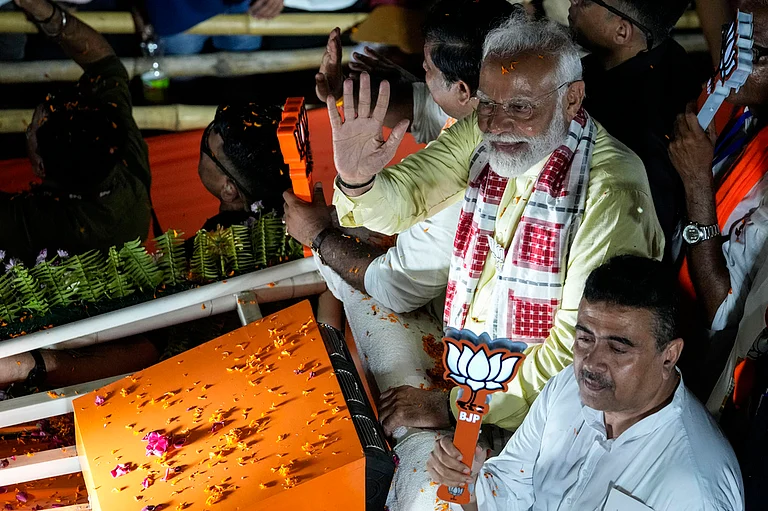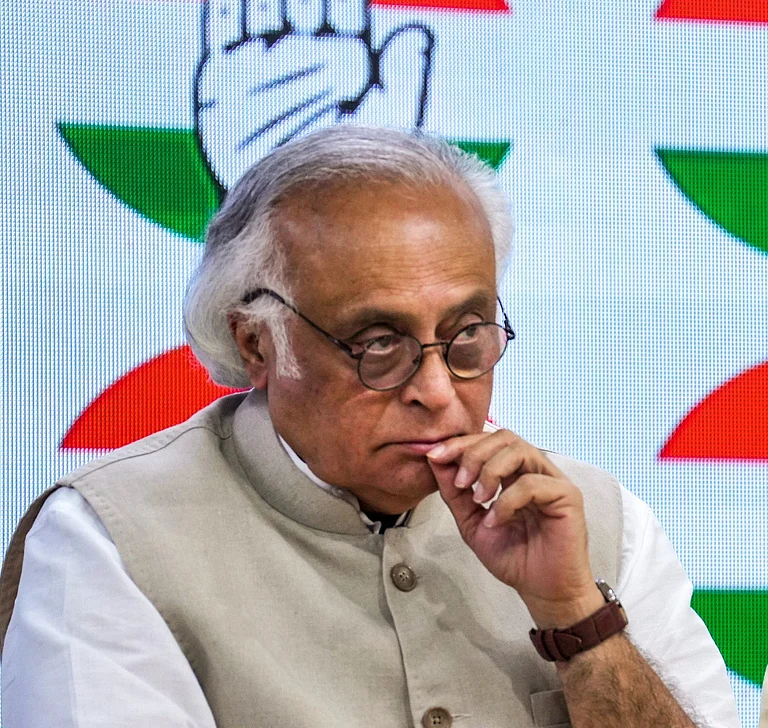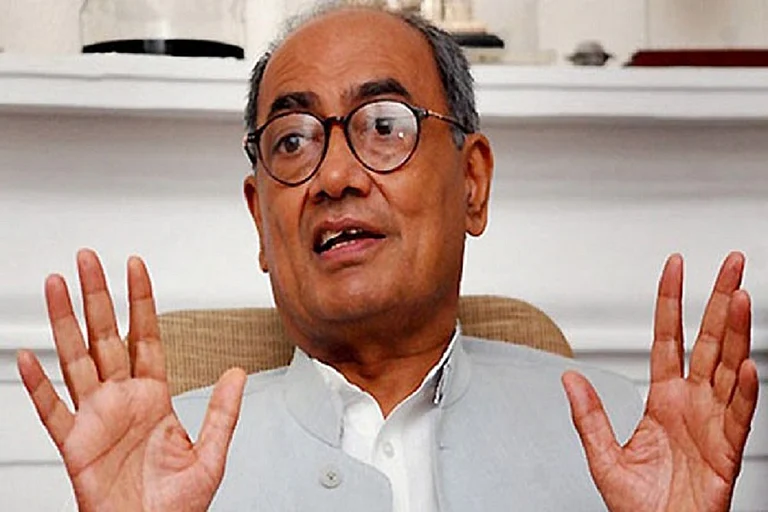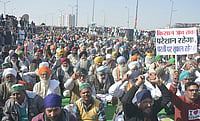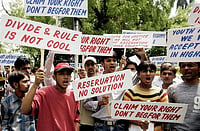The Congress on Monday distanced itself from senior leader Digvijaya Singh's comments on the 2019 Balakot airstrike.
Labelling Singh's remarks as his personal opinion, the Congress said it supports all military actions in national interest.
The 2019 Balakot air strike refers to the Indian Air Force (IAF) mission that bombed a terrorist camp in Balakot of Khyber Pakhtunkhwa province of Pakistan. The strike was carried out in response to the Pulwama terrorist attack in which a suicide bomber killed 40 Central Reserve Police Force (CRPF) personnel.
Congress communications chief Jairam Ramesh tweeted, "The views expressed by senior leader Digvijaya Singh are his own and do not reflect the position of Congress. Surgical strikes were carried out before 2014 by UPA government. Congress has supported and will continue to support all military actions that are in the national interest."
Singh and other Opposition leaders have questioned the 2019 air strikes as well as the 2016 surgical strikes in which Indian personnel struck a terrorist camp in Pakistan Occupied Jammu and Kashmir (POJK). The 2016 surgical strike was in response to the Uri terrorist attack in which 19 Indian Army personnel were killed.
What did Digvijaya Singh say?
Addressing a public meeting during the Bharat Jodo Yatra in Jammu and Kashmir, Digvijaya Singh alleged that the Narendra Modi-led Union government did not agree to the CRPF request of flying its personnel from Srinagar to Delhi and 40 soldiers sacrificed their lives in Pulwama in 2019 to a terror attack.
He said, "They talk of surgical strikes. They claim to have killed so many people but no proof is given. They are ruling by peddling a bundle of lies.
Singh drew sharp criticism from the Bharatiya Janata Party (BJP), which accused the Congress "insulting" the armed forces after being "blinded" by its "hate" for Modi.
In a tweet in Hindi later, Singh said, "From where did the terrorists get 300 kg of RDX in Pulwama incident? DSP Davinder Singh was caught with terrorists but then why was he released? We also want to know about the friendship between the prime ministers of Pakistan and India."
In his video message attached to the tweet, Singh said 40 CRPF personnel sacrificed their lives in Pulwama, but this government has not been able to reveal from where three quintals of RDX came.
He said, "Besides, the government has not been able to answer where is DSP Davinder Singh, who was caught involved with terrorists. Why was he let free and why was a case of treason not registered against him? We would also like to know from the prime minister as to what kind of relations he has with Pakistani prime minister that both are praising each other. At least, he should answer these questions."
BJP spokesperson Gaurav Bhatia hit out at the Congress and said such comments show that the Rahul Gandhi-led foot march across the country is Bharat Jodo Yatra only in name while he and his party colleagues are working to "break" the country.
He said, "It is essentially "Bharat todo yatra...India will not tolerate if they speak against armed forces. Rahul Gandhi and the Congress hate PM Modi but it seems they have been blinded by the hate to an extent that their dedication to the country has withered away."
What's 2016 surgical strike, 2019 Balakot air strike?
The two of the most high-profile Indian military actions during Prime Minister's Narendra Modi's tenure have been the 2016 surgical strike in POJK and the 2019 Balakot airstrike.
There was also a third surgical strike in Myanmar in 2015 but it did not receive that much political attention.
On June 4, 2015, 18 soldiers of the Indian Army were killed in Manipur's Chandel districts. The attack was carried out by insurgents that also have camps in neighbouring Myanmar and they often cross over there.
As a response, the Indian special forces crossed into Myanmar and carried out an operation against the insurgents on June 9, 2015. The PTI reported, "The surgical strike inside Myanmar was carried out by a crack team of about 70 commandos of the Indian Army who finished the operation within 40 minutes, leaving 38 Naga insurgents dead and seven injured."
On September 18, 2016, terrorists attacked an Indian Army camp in early morning and killed 19.
As a response, the Indian Army personnel on Sept. 28-29 crossed the de facto India-Pakistan border in Kashmir, called the Line of Control (LoC), and carried out an operation against terrorists in the Pakistan Occupied Jammu and Kashmir (POJK). This is the famous "surgical strike". Though the Myanmar operation is also technically a surgical strike, the media and the politicians refer to the POJK operation as the surgical strike.
While the Union government the BJP hailed the operation, the Congress and the Opposition questioned it and asked for proof.
The 2016 POJK surgical strike was a turning point as it was a covert operation like some conducted before. As the Modi government decided to own the operation, while it benefitted for the success, there was also an equal risk of facing national and international flak had it gone awry.
"Prime Minister Narendra Modi and his team factored in the possibility of any escalation based on briefings by the military. The fallout of the decision to strike across the LoC and own it at the highest level has had many consequences both in military and strategic terms. To begin with, the government's pro-active strategic initiative has given military a clear signal that it need not perpetually be bound by a defensive and or reactive approach in dealing with proxy war waged by Pakistan in J&K," notes national security analyst Nithin A Gokhale in his book Securing India: The Modi Way.
On February 14, 2019, a suicide bomber struck a CRPF convoy in J&K's Pulwama district. The attack killed 44 CRPF personnel and plunged the country in grief and anger.
As a response, the Modi government sanctioned an unprecedented operation carried out on February 26. Indian Air Force planes crossed into Pakistan and struck a terrorist facility in Balakot in Khyber Pakhtunkhwa. The operation was another milestone as the Indian response to Pakistan was always reserved because of Pakistan being a nuclear state and its threat of nuclear retaliation. However, the Modi government figured out the nuclear threshold would not be crossed and it was not.
Gokhale notes, "Prime Minister MOdi had forever redrawn the self-imposed redlines with Pakistan, breaking out of decades-long timidity that had pervaded the minds of the decision-makers...When we look back maybe 20 years later we will realise how significant this milestone has been as far as the strategic calculus between India and Pakistan is concerned."
However, the Balakot air strike was not without a fallout. The Pakistan retaliated the next day with an air raid inside India and an air battle in Indian skies began. The Pakistan fighters bypassed Indian air patrols and dodged Indian air defences and dropped bombs in J&K. The Pakistanis also shot down an Indian figher plane and took hostage the Indian pilot who landed inside POJK. The Indians also claimed that they shot down a Pakistani figher plane in the air battle.
The pilot, Wing Commander Abhinandan Varthaman, was safely returned to India later.
The Congress controversies on Indian strikes, terror
The Opposition has repeatedly asked for proof for these operations and has dismissed the claims for such operations.
In 2016, Congress leader Sanjay Nirupam called the surgical strikes "fake".
In 2016, Aam Aadmi Party (AAP) supremo and Delhi Chief Minister Arvind Kajriwal had asked Modi to bring proof to shut Pakistan. However, it was interpreted as a demand to furnish proof to show the strikes actually happened.
Later, the same pattern emerged after the Balakot air strike.
In 2019, Sam Pitroda said people of India need to know the facts. Citing international media, he said it says no one was killed where there reports of 300 deaths from India.
Senior Congress leader BK Hariprasad said the Pulwama attack was a "fixed match" between India and Pakistan.
Hindustan Times quoted him as saying, "Ravi Shankar Prasad should clarify whether there is any match-fixing between Pakistan and Narendra Modi. Or else, without their knowledge this Pulwama instance would not have taken place. If you look at the chain of events that have taken place after Pulwama it looks like Narendra Modi had a match-fixing with Pakistan people."
Earlier, the Congress also drew flak for the soft stance on Batla House encounter, which a section of the party has called fake over the years.
On September 19, 2008, a Delhi Police team visited a house (numbered L-18) in Batla House in Jamia Nagar days after serial blasts in Delhi killed 30 people. Indian Mujahideen (IM) terrorists staying in the house opened fired at the police personnel and one police officer and two terrorists were killed in the subsequent encounter. One terrorist was also captured alive. There were a total of six terroists in the house.
The deceased police officer was Inspector Mohan Chand Sharma of of Delhi Police Special Cell. He was a vetaran of counter-terrorism operations and was awarded the AshoK Chakra, the highest gallantry honour in peacetime.
However, Congress leader Digvijaya Singh, who has also drawn flak for comments on Pakistan strikes, has maintained that it was a fake encounter.
Congress leader Salman Khurshid also claimed that the then Congress President Sonia Gandhi "wept bitterly" after she saw encounter photos.
However, just like the Pakistan strikes, the Congress distanced itself from Singh's statement on Batla House. The Manmohan Singh-led government honoured Inspector Mohan Chand Sharma with the Ashok Chakra, the highest peacetime gallantry award.
(With PTI inputs)



